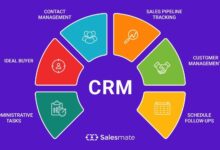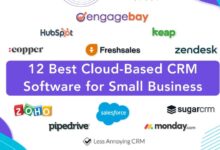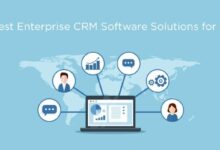Affordable CRM Software for Startups
Affordable CRM Software for Startups is crucial for early-stage businesses navigating resource constraints. Finding the right balance between functionality and cost is paramount. This guide explores essential features, integration capabilities, ease of use, and scalability considerations when selecting affordable CRM solutions tailored to the unique needs of startups. We’ll delve into pricing models, crucial functionalities, and the importance of seamless integration with other business tools, ultimately guiding you toward making an informed decision.
Defining “Affordable” for Startups
Affordability in CRM software for startups is a relative concept, heavily dependent on the company’s size, stage of development, and specific needs. What constitutes “affordable” for a bootstrapped solopreneur will differ significantly from the budget of a rapidly scaling tech startup with Series A funding. Understanding this nuance is crucial for selecting the right CRM solution without compromising essential functionality.
Defining affordability goes beyond simply the monthly or annual subscription fee. Implementation costs, including the time spent configuring the system and integrating it with existing tools, can add up quickly. Furthermore, training employees to effectively utilize the CRM software is a significant factor, involving both the cost of training materials and the time commitment of staff. These hidden costs can significantly impact the overall value proposition and should be factored into the budget.
Budget Considerations for Different Startup Sizes
Startup budget constraints vary widely. A solopreneur might comfortably allocate $20-$50 per month, while a small team (5-10 employees) could justify $100-$300 monthly. Larger startups (20+ employees) with more complex sales processes may allocate $500-$1500 or more per month, depending on the features required. Annual contracts often offer discounts, making the overall cost more manageable. For example, a $100/month plan could cost $1000 annually, potentially with a 10-20% discount applied. The optimal budget will always depend on the specific features required, usage volume, and available resources.
Factors Influencing Perceived Affordability Beyond Price
The perceived value of a CRM system extends beyond its price tag. Ease of use significantly influences affordability. A system that is intuitive and requires minimal training is inherently more affordable than a complex system requiring extensive onboarding and ongoing support. Similarly, robust integration capabilities with other business tools (e.g., accounting software, email marketing platforms) reduce the overall cost of managing multiple systems. Strong customer support also adds to the perceived value, as readily available assistance minimizes downtime and frustration. Finally, scalability is key. A CRM that can adapt to the changing needs of a growing startup, without requiring costly upgrades or migrations, represents a long-term cost savings.
Comparison of Pricing Tiers of Popular CRM Options
The following table compares pricing tiers of some popular CRM options. Note that pricing can vary based on features, number of users, and contract length. This is a snapshot and should be verified directly with the respective vendors.
| CRM Software | Basic Plan (Monthly/User) | Standard Plan (Monthly/User) | Premium Plan (Monthly/User) |
|---|---|---|---|
| HubSpot CRM | Free | $450 | $1200 |
| Zoho CRM | $14 | $25 | $40 |
| Salesforce Sales Cloud | $25 | $75 | $150 |
| Freshsales | Free | $15 | $49 |
Key Features for Startup CRMs
Choosing the right CRM is crucial for startups, as it directly impacts sales efficiency and customer relationship management. A well-chosen CRM can streamline processes, improve team collaboration, and ultimately contribute to faster growth. This section will outline essential features for early-stage businesses and demonstrate how these features translate into tangible benefits.
Early-stage businesses need a CRM that balances simplicity with functionality. Overly complex systems can be overwhelming and counterproductive. The focus should be on core features that address immediate needs, paving the way for scalability as the business expands.
Essential CRM Features for Startups
Several key features are essential for startups seeking to optimize their sales and customer interactions. These features provide a solid foundation for managing contacts, tracking leads, and generating basic reports, offering immediate value and a clear return on investment.
- Contact Management: A robust contact management system allows for centralized storage and organization of all customer information, including contact details, communication history, and purchase records. This eliminates data silos and ensures everyone has access to a single source of truth.
- Lead Tracking: Effective lead tracking enables startups to monitor the progress of potential customers through the sales funnel. This includes features for assigning leads, managing follow-ups, and recording interactions. This provides valuable insights into conversion rates and areas for improvement.
- Basic Reporting and Analytics: Simple reporting capabilities allow startups to track key metrics like sales performance, customer engagement, and lead conversion rates. This data-driven approach provides valuable insights for strategic decision-making and allows for the continuous optimization of sales strategies.
Leveraging CRM Features for Improved Sales Processes
Startups can leverage specific CRM features to significantly enhance their sales processes and improve overall efficiency. The following examples illustrate how even basic CRM functionalities can make a substantial difference.
- Improved Lead Qualification: Using lead scoring and tagging within the CRM, sales teams can prioritize high-potential leads, focusing their efforts on prospects most likely to convert. This increases sales efficiency and reduces wasted time on unqualified leads. For example, a startup could tag leads based on industry, company size, or website engagement, prioritizing those meeting specific criteria.
- Streamlined Communication: Centralized communication history within the CRM allows sales reps to easily access past interactions with a customer. This ensures consistent messaging and prevents the repetition of information, leading to more efficient and personalized communication. Imagine a scenario where a sales rep can instantly see all previous email exchanges and phone calls before reaching out to a potential client.
- Enhanced Sales Forecasting: Basic reporting features within a CRM enable startups to track sales performance and predict future revenue. By analyzing historical data on lead conversion rates and sales cycles, startups can make more informed decisions regarding resource allocation and sales targets. For instance, a startup could track the average deal size and closing time to project revenue for the next quarter.
Free vs. Paid CRM Options: Core Functionality Comparison
The choice between free and paid CRM options hinges on a startup’s specific needs and resources. While free options offer basic functionality, paid versions provide more advanced features and scalability. This comparison highlights the key differences.
| Feature | Free CRM | Paid CRM |
|---|---|---|
| Contact Management | Basic contact storage and organization | Advanced contact management with custom fields, segmentation, and automation |
| Lead Tracking | Limited lead tracking capabilities | Comprehensive lead tracking with scoring, automation, and detailed reporting |
| Reporting and Analytics | Basic reporting features | Advanced reporting and analytics with customizable dashboards and real-time data |
| Integration | Limited integration options | Extensive integration capabilities with other business tools |
| Customer Support | Limited or no customer support | Dedicated customer support channels |
Integration Capabilities
A crucial aspect of any effective CRM, especially for resource-conscious startups, is its ability to seamlessly integrate with other essential business tools. This interconnectedness prevents data silos, streamlines workflows, and ultimately boosts efficiency and productivity. A well-integrated CRM acts as a central hub, consolidating information from various sources and providing a holistic view of customer interactions.
Seamless data flow between different business applications offers significant advantages. Eliminating the need for manual data entry saves valuable time and reduces the risk of human error. Automated data synchronization ensures that all applications maintain consistent and up-to-date information, leading to better decision-making based on accurate, real-time data. This integration allows for a more efficient and streamlined workflow, improving overall team productivity. For example, a sale recorded in the CRM automatically updates inventory levels in the accounting software, preventing stock discrepancies and enhancing inventory management.
Popular CRM Integrations
Many affordable CRM platforms offer a range of integrations designed to enhance functionality and streamline operations. These integrations often extend to email marketing platforms, social media management tools, accounting software, and other applications commonly used by startups. The availability of specific integrations can vary depending on the CRM provider and pricing tier.
- Email Marketing Platforms: Integrations with platforms like Mailchimp, Constant Contact, and HubSpot allow for automated email campaigns triggered by CRM events (e.g., a new lead, a customer purchase). This automated communication improves customer engagement and nurtures leads more effectively.
- Social Media Management Tools: Connecting the CRM with tools like Hootsuite or Buffer allows for tracking social media interactions and integrating this data into customer profiles. This provides a comprehensive view of customer engagement across various channels.
- Accounting Software: Integrations with accounting software such as Xero, QuickBooks, and FreshBooks automate invoice creation, payment tracking, and revenue reporting. This streamlines financial processes and provides a clear view of financial performance related to customer activity.
- E-commerce Platforms: Connecting the CRM with platforms like Shopify or WooCommerce allows for automated customer data import and syncing order information, improving customer service and providing valuable insights into sales trends and customer behavior.
- Project Management Tools: Integrations with tools like Asana or Trello can help manage customer projects and track progress, improving collaboration and project delivery.
Ease of Use and Implementation
For bootstrapped startups, time is a precious commodity. Choosing a CRM shouldn’t add to the already overwhelming workload. Ease of use and a straightforward implementation process are paramount for ensuring quick adoption and maximizing the return on investment. A user-friendly CRM empowers non-technical founders to manage customer relationships effectively, without needing extensive training or technical support.
A CRM’s intuitive design directly influences its adoption rate. Complexity often leads to user frustration and abandonment, negating the benefits of the system. Conversely, a simple, visually appealing interface encourages consistent use, fostering better data management and improved customer interactions.
Intuitive CRM Interfaces and User Adoption
Intuitive interfaces prioritize clarity and efficiency. For example, a CRM with a drag-and-drop interface for task management, a clear visual representation of sales pipelines, and customizable dashboards allows users to quickly grasp the system’s functionality. This contrasts sharply with systems burdened by complex menus, confusing terminology, and a lack of visual aids. CRMs like HubSpot, with its visually appealing dashboards and streamlined workflows, demonstrate the positive impact of intuitive design on user adoption. Their high user satisfaction ratings often correlate with their commitment to ease of use. Another example is Pipedrive, known for its straightforward sales pipeline visualization and simple interface, which leads to high user engagement.
Step-by-Step CRM Implementation for Small Startups
A successful CRM implementation requires a structured approach, even for small teams. The following steps provide a framework for a smooth transition:
- Define Objectives and Requirements: Clearly outline the startup’s goals for the CRM. What specific problems will it solve? What data needs to be tracked? This step ensures that the chosen CRM aligns with the company’s needs.
- Choose the Right CRM: Select a CRM that fits the budget and aligns with the defined objectives. Consider factors such as ease of use, scalability, and required integrations. Free or affordable options like Zoho CRM or Bitrix24 could be suitable for early-stage startups.
- Data Migration (if applicable): If migrating data from existing systems, ensure a smooth and accurate transfer. This might involve exporting data from spreadsheets or other platforms and importing it into the new CRM. Data cleansing and validation are crucial to maintain data integrity.
- User Training and Onboarding: Provide comprehensive training to all users. This can include short video tutorials, online documentation, and possibly a brief in-person training session. Start with essential features and gradually introduce more advanced functionalities.
- Testing and Refinement: Thoroughly test the system to identify any issues or areas for improvement. Regularly review and adjust workflows to optimize efficiency and user experience. This iterative process ensures the CRM adapts to the evolving needs of the startup.
- Ongoing Monitoring and Optimization: Continuously monitor CRM usage and gather feedback from users. Make adjustments as needed to ensure the system remains effective and user-friendly. Regular data analysis can highlight areas where improvements can be made.
Scalability and Future Growth
Choosing a CRM that can grow with your startup is crucial for long-term success. A system that works perfectly for a team of five might become a bottleneck as your company expands to fifty, impacting efficiency and potentially hindering growth. Investing in a scalable CRM from the outset minimizes the disruption and cost associated with migrating to a new system later.
The ability of a CRM to handle increasing data volume, user accounts, and complex workflows is paramount. A scalable solution seamlessly adapts to your evolving needs, preventing the need for frequent, costly system overhauls. This ensures your CRM remains a valuable asset, rather than a liability, as your startup progresses.
Assessing CRM Scalability
Evaluating the scalability of different CRM solutions requires a multifaceted approach. It’s not simply about the number of users a system can support; consider factors like database capacity, API capabilities for integrations, and the CRM’s overall architecture. Vendor transparency regarding their infrastructure and scaling strategies is also key. For example, a cloud-based CRM often offers better scalability than an on-premise solution, as cloud providers typically handle infrastructure upgrades and expansion. Look for CRMs that provide clear documentation on their performance benchmarks under different load conditions and offer various pricing tiers to accommodate growth. Case studies showcasing how the CRM has scaled to support large organizations can provide valuable insights.
Planning for CRM Upgrades and Expansions
Proactive planning is essential to manage CRM upgrades and expansions smoothly. This involves anticipating your future needs based on projected growth and adopting a phased implementation approach. Regularly assess your CRM usage patterns to identify areas for improvement or expansion. For instance, if your sales team begins using more complex forecasting tools, you might need to upgrade to a plan that includes advanced analytics features. Develop a roadmap that outlines the steps needed to upgrade or expand your CRM system, including timelines, budget allocations, and potential resource requirements. Consider involving key stakeholders in the planning process to ensure buy-in and to gain valuable input on future needs. Prioritize features that directly support business goals and avoid unnecessary complexities. Regular system maintenance and updates are also vital to maintain optimal performance and security. By implementing these strategies, you can ensure that your CRM continues to support your business objectives as your startup grows.
Customer Support and Resources
For startups, choosing affordable CRM software is only half the battle. The other half hinges on readily available and effective customer support. Without it, even the most feature-rich and user-friendly system can become a frustrating burden, hindering productivity and potentially jeopardizing crucial customer relationships. Reliable support ensures smooth implementation, efficient troubleshooting, and ongoing success with your chosen CRM.
A robust support system is crucial for startups due to their limited resources and often smaller teams. Troubleshooting technical issues, understanding software functionality, and receiving timely assistance can make the difference between a successful CRM implementation and a costly, time-consuming struggle. Moreover, effective training resources can empower your team to utilize the CRM’s full potential, maximizing its return on investment.
Types of Customer Support Offered by CRM Providers
Different CRM providers offer varying levels and types of customer support. Understanding these differences is vital when making your selection. Some providers rely heavily on comprehensive online documentation, including FAQs, tutorials, and video guides. Others offer email support, providing a written record of interactions and allowing for more detailed explanations. A higher tier of support often includes phone support, offering immediate assistance for urgent issues. Some advanced providers may even offer live chat support, providing instant answers to quick questions. Finally, some CRMs offer dedicated account managers or onboarding support for larger clients or those requiring more intensive assistance.
Evaluating Customer Support Quality and Responsiveness
Assessing the quality and responsiveness of a CRM provider’s support is crucial. Before committing to a particular system, consider several factors. First, examine the provider’s website for details on their support offerings. Look for readily accessible FAQs, clear contact information, and descriptions of their support channels (phone, email, chat, etc.). Next, look for customer reviews and testimonials that specifically address the quality of their support. Platforms like G2 and Capterra often contain detailed reviews that can provide valuable insights. Consider contacting the provider directly with a test question or issue to gauge their responsiveness and helpfulness. Measure the time it takes to receive a response and the clarity and effectiveness of the solution provided. Finally, consider the availability of support – is it 24/7, or limited to business hours? This factor is particularly important for startups operating across multiple time zones.
Illustrative Examples of Affordable CRMs
Choosing the right CRM for your startup can feel overwhelming, but focusing on affordability and key features simplifies the process. This section examines three distinct affordable CRM options, highlighting their strengths and weaknesses to aid in your decision-making. Remember that the “best” CRM depends entirely on your specific needs and preferences.
HubSpot CRM
HubSpot CRM offers a robust free plan with many features typically found in paid options. Its strength lies in its comprehensive suite of tools, including contact management, email marketing, and basic sales automation, all seamlessly integrated. However, its scalability limitations might necessitate a transition to a paid plan as your business grows.
HubSpot CRM’s user interface is clean and intuitive, employing a predominantly white background with clear, concise icons and menus. The dashboard presents key metrics in easily digestible charts and graphs, providing a quick overview of sales activities and customer interactions. Navigation is straightforward, with a left-hand sidebar providing access to all core features, ensuring a smooth user experience even for those unfamiliar with CRM software.
Zoho CRM
Zoho CRM is a versatile and highly customizable option, offering a wide range of features at competitive prices. Its flexibility caters well to startups with evolving needs. A potential drawback could be the sheer number of features; it might take some time to master the full functionality.
Zoho CRM presents a more complex interface than HubSpot, with a darker color scheme and a denser layout of information. The dashboard is customizable, allowing users to select the metrics and widgets most relevant to their workflow. While this flexibility offers great power, it might initially feel overwhelming to less tech-savvy users. The interface utilizes a tabbed structure, allowing for easy switching between different sections and features.
Freshsales CRM
Freshsales is known for its user-friendly interface and focus on sales automation. It provides a good balance between functionality and ease of use, making it an attractive choice for startups prioritizing efficient sales processes. However, compared to Zoho, it may lack the depth of customization options.
Freshsales boasts a clean and modern interface, with a bright, airy feel. The dashboard prioritizes visual clarity, using color-coded elements to highlight key information and progress. Navigation is straightforward, with a clear menu structure and intuitive icons. The overall experience is designed to be minimally distracting, allowing users to focus on managing their sales pipeline effectively.
Epilogue
Selecting the right affordable CRM is a pivotal decision for any startup. By carefully considering factors like essential features, integration capabilities, ease of use, and scalability, startups can leverage CRM software to streamline operations, improve sales processes, and foster sustainable growth. Remember to prioritize user-friendliness, reliable support, and a solution that can adapt to your evolving needs as your business expands. The right CRM can be a powerful tool in your journey to success.





